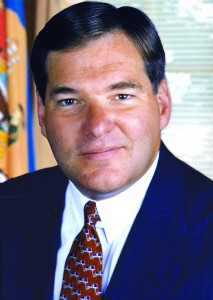Governor recognizes Levin’s efforts to help Delaware post strongest job growth in the region
Dover, DE – Having helped rebuild Delaware’s economy from the depths of the Great Recession to record employment numbers and the best job growth in the region, Economic Development Director Alan Levin announced today that he would leave the Markell Administration at the end of the year’s legislative session to pursue a new business opportunity.
Beginning in July, Levin will join SoDel Concepts, the successful restaurant and hospitality group in Sussex County started by his late friend and mentor Matt Haley. He will serve as Senior Advisor to the management team to help take their successful Delaware company to the next level in a dynamic industry.
“Alan took his position at a particularly challenging economic time,” said Markell. “Alan has shown great leadership during six years that have been marked by great progress in recovering from the Great Recession and addressing the challenges of the 21st century.”
“Successfully improving the economy since 2009 has required a relentless pursuit of opportunities to attract new companies and support existing ones, as well as an ability to recognize and adjust to the forces of globalization and technological innovation that are shaping today’s world. Alan excels in all of these areas and I’m forever grateful for his tireless service to our state and for his long-term commitment to the Administration.”
Levin has led the Delaware Economic Development Office (DEDO) since Governor Markell took office in 2009, at a time when tens of thousands of Delawareans were losing their jobs as result of the national economic crisis. As the Administration’s top priority focused on putting people back to work, the state’s initial economic development successes included re-opening the shuttered oil refinery in Delaware City and attracting new manufacturing and other economic development to the site of the old Chrysler plant in Newark.
Other large and small companies that have re-located or expanded their operations in Delaware include: Amazon, Baltimore Aircoil, Barclays, Atlantis Industries, Calpine, Citigroup, Capital One, ILC Dover, Johnson Controls, JP Morgan Chase, Kraft Foods, Miller Metal, Mountaire Farms, PTM Manufacturing, Purdue, Sallie Mae, and Testing Machines, Inc.
“I would like to express my gratitude to Governor Markell for the opportunity to serve the people of Delaware during this very difficult time in our state’s history,” said Levin. “From the start it has been challenging, but I am pleased to say that we are in a much better place than when we started and the outlook for our citizens in the years to come is much brighter because of the hard work of the staff at DEDO. While I leave with mixed emotions, the opportunity to perpetuate the great work of entrepreneur and humanitarian Matt Haley will allow me to continue service to the people of Delaware in different but equally rewarding ways.”
At 4.4 percent, Delaware has had the fastest job growth in the Mid-Atlantic over the past two years, also exceeding the national average of four percent. Meanwhile, the state’s unemployment rate has fallen to 4.6 percent, the lowest in the region, and average annual wages have increased more than nine percent since 2009, among the best in the region.
In releasing its job creation index for 2014, Gallup noted that Delaware had gone “from one of the lowest-ranking states in 2008 and 2009 to one of the top-ranking in 2013 and 2014. Delaware holds the distinction of being the only state anywhere along the Eastern seaboard to be in the top 10.”
In addition, Delaware was recently recognized by The Information Technology and Innovation Foundation as one of the top two states best prepared for the new economy, which is “marked by globalization, technological innovation and entrepreneurial development.”
Markell plans to make an announcement about a nomination for the next DEDO Director in the coming days.
###